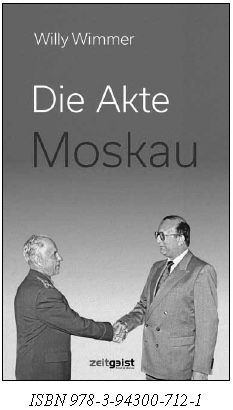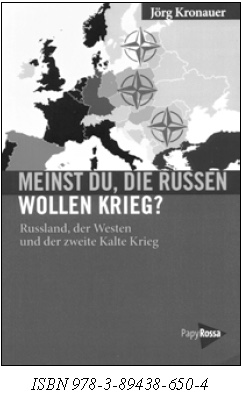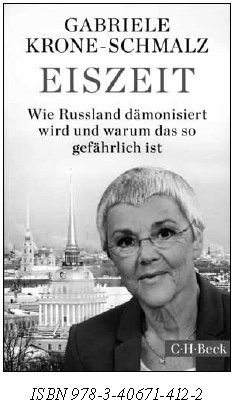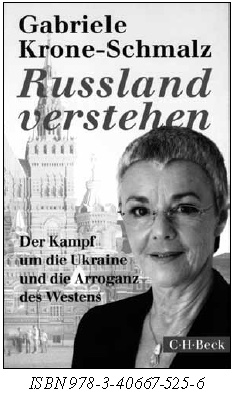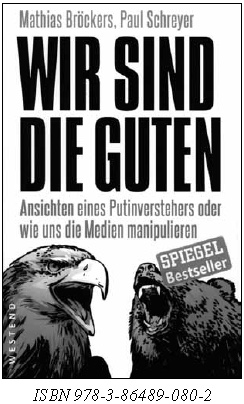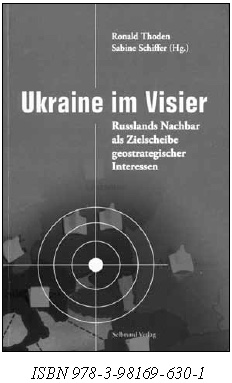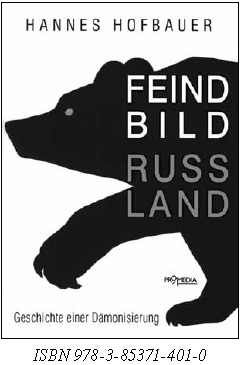NATO and EU are escalating the “Bogeyman Russia”
NATO and EU are escalating the “Bogeyman Russia”
by Karl Müller
In the run-up to the Russian elections which were a great success for the President and only a few weeks before the Football World Cup in Russia, accusations against the country and its President have reached a level far beyond what we got used to during the first Cold War. What is the objective of the political elites in NATO and EU? Why are they progressing along the escalation spiral? What needs to be said about the genesis of this conflict? It’s high time to come to one’s senses!
Although other – also German – authors have presented other facts,1 the majority of the political elites in the NATO and EU states stick to their storyline: Russia is to be presented as an evil aggressor which the “free world” needs to confront head-on. Whenever these “elites” are facing dissent, like e.g. the CDU politician and member of the EU parliament Elmar Brok (Deutschlandfunk, 19 March 2018), they turn rude, abusive and authoritarian. Their messages are blunt and it seems like they are aware that they are not telling the truth but their crude slogans are meant to intimidate and to silence other opinions. They are supported by most of the leading media and by media-aware “experts”. The constant propaganda against Russia and mainly against the just re-elected President Putin has a paranoid touch. But it is paranoia with a purpose.
What has really happened?
This is why it is essential to remember the real lines of development even though it means to repeat oneself over and over. But the efforts of Russia’s enemies to withhold and cover up the origin of the conflict are huge. Historical thinking is not wanted; flashlights loaded with emotions are meant to shut off reason.
It would be necessary to go far afield – some of the authors do this – and to throw some light on the British and US-American strategy for global power during the past 150 years. Here we only want to sketch, with a few brush strokes, the development after the dissolution of the Warsaw Pact and the Soviet Union.
After the supposed end of the Cold War many people started to hope for a future living together in peace, freedom and equality. The Paris Declaration of the Conference for Security and Co-operation in Europe (CSCE, today OSCE), adopted in November 1990, still with the participation of the Soviet Union, expressed this clearly.
Since 1991 the US are striving to be the only global power
But as early as in the second Gulf War in 1991 the US political and military leadership showed what they were really striving for: for a “New World Order” according to US-American ideas and for a US-American access to the central reserves of raw materials of the world. After 1991 the US wanted to be the hegemon, the only superpower. And it is not a coincidence that the German translation of the former US Security Advisor Zbigniew Brzezinski’s book “The Grand Chessboard” was titled exactly like this: “The only superpower”. The German subtitle “America’s strategy for supremacy” was not an expression of criticism but the attempt to describe precisely the US-American ambitions accepted in the West. The others should comply. That the US-American Neo-Conservatives’ project of the late 1990s was named “Project for a New American Century” was fully matching this line.
Russia was experiencing the worst phase of its history
This affected also the successor states of the Soviet Union including Russia. The USA claimed huge amounts of Russian raw materials; the country was subjected to a market radical “Shock Doctrine” (Naomi Klein2); US-American and other Western NGOs and media started their attempt to dominate the public opinion of the country; violent Islamist separatists were supported and there were even US-American plans to divide the country. Similar as in Anglo-Saxon geopolitical plans from the early 20th century, there was one thing that should be prevented by all means: an independent countervailing power on the Eurasian Continent opposing the US (and their Anglo-Saxon allies), for example a close cooperation of other European states, led by Germany and France, with Russia. Already under the Soviet President Gorbachev, the Russian side has spoken of the “Common European House”. This was to be prevented by all means.
Turning point with the first presidential term of Vladimir Putin
Russia itself had to pay a high price; the 1990s were among the worst in the history of the country. This changed with the politics of the new President Vladimir Putin at the beginning of the new century. This was realised quickly by the US-American side. Early in the new century Brzezinski railed in articles and interviews against the new Russian President and his politics, “reminded” Russia of its role in the game and warned from the Russian claim to be accepted as an equal power. Neo-conservative politicians of the George W. Bush administration showed up in the Baltic States, stirring anti-Russian sentiments. The Baltic and other former Warsaw Pact states had already been scheduled for NATO and EU and were now “integrated” step by step. The NATO border came closer to Russia and even in the former European and Asian autonomous republics of the Soviet Union, “colour revolutions” were meant to install anti-Russian regimes.
Putin’s Munich Speech 2007
The obvious public turning point in East-West relations after 1990 was marked by Russian President Putin’s speech to the Munich Security Conference in February 2007.3 Putin made it clear that Russia is striving for equality in the world of states, is demanding compliance with the UN Charter and international law and is no longer willing to accept the policy of the USA and NATO, which does not care about any legal principles. Pro memoria: After a decade that destroyed Yugoslavia in 1999, NATO had waged a war against the remaining Federal Republic of Yugoslavia, which was linked to Russia, in violation of international law, and the USA has built up a huge military base in Kosovo that is directed against Russia: Camp Bondsteel. After the beginning of the NATO war against Afghanistan in 2001, in which Russia first even offered its support, Russia was flooded with Afghan narcotics, and in the same year the USA terminated the ABM Treaty because they wanted to set up their missile defence system, which was directed against Russian missiles from the outset, in Eastern Europe. In the same year, the US government also announced its endless war “against terrorism” and against a supposed “axis of evil”. In 2003 a “coalition of the willing” under the leadership of the USA had started a war against Iraq in violation of international law, already in 2004 there was a first coup attempt in the Ukraine (“Orange Revolution”) ... and so on and so forth.
Even the chaos in the Middle East is part of the deployment plan
Developments in the Middle East also have something to do with relations between the West and Russia. Aktham Suliman, whose book “War and Chaos in the Middle East. An Arab View”, presented in Current Concerns No 6 of 13 March, addresses in its final chapter the question of the purpose of the chaos instigated by the USA and its allies and interestingly writes that all this has one primary purpose: to be an important component of a ‘Third World War’ – against Russia.
The USA, NATO and the EU have not taken the Russian President’s 2007 warning seriously. On the contrary: the USA, NATO and following behind the EU stuck to their goal of weakening and excluding Russia4 – despite all the good business that they naturally enjoyed doing. Long before 2014 the Russian President was compared to Hitler and Stalin by exposed figures like Brzezinski.5 Further sources of fire caused by NATO and EU states and further burnt earth followed: Georgia, Libya, Syria, Yemen, Ukraine … Hardly anything is true of what our political “elites” publicly say to these countries. It is always about something completely different, and there is still no sign of a reversal; on the contrary.
Wouldn’t it be better to solve the own problems instead of playing with fire?
What is most interesting about the development of the past 25 years is that Russia’s enemies are acting from a position of military strength, but also from a position of fundamental economic and social problems and social and cultural decay. The list is long. Wouldn’t it be much better to do everything possible to finally make their own countries doing better again – solid, honest and not at the expense of others – instead of playing with fire? •
1 For example: Bröckers, Mathias; Schreyer, Paul. Wir sind die Guten. Ansichten eines Putinverstehers oder wie uns die Medien manipulieren. 2014; Thoden, Ronald; Schiffer, Sabine (Hg.). Ukraine im Visier. Russlands Nachbar als Zielscheibe geostrategischer Interessen. 2014; Krone-Schmalz, Gabriele. Russland verstehen. Der Kampf um die Ukraine und die Arroganz des Westens. 2015; Hofbauer, Hannes. Feindbild Russland, Geschichte einer Dämonisierung. 2016; Wimmer, Willy. Die Akte Moskau. 2016; Krone-Schmalz, Gabriele. Eiszeit. Wie Russland dämonisiert wird und warum das so gefährlich ist. 2017; und ganz neu im März erschienen: Kronauer, Jörg. Meinst Du, die Russen wollen Krieg? Russland, der Westen und der zweite Kalte Krieg. 2018.
2 Klein, Naomi. The Shock Doctrine. The Rise of Disaster Capitalism. 2007; with regard to Russia see especially pp. 246–262
3 The fact that even before Vladimir Putin took office the Russian government no longer agreed with the policy of the USA and NATO became apparent at the start of NATO’s war of aggression against the Federal Republic of Yugoslavia in March 1999, which was contrary to international law. The then Russian Prime Minister Primakov was on his way to the USA at the start of the war and immediately stopped his trip when he learned of the blatant breach of international law by NATO.
4 This is precisely what the former State Secretary in the German Ministry of Defence and then Vice-President of the OSCE Parliamentary Assembly, Willy Wimmer, who attended a conference in Bratislava, Slovakia, was shocked to discover as early as April 2000. His letter to the German Chancellor Schröder is a central source of contemporary history. It can be found for example at: www.nachdenkseiten.de
5 For example, in an interview with the German daily “Die Welt” on 11 August 2008: “Zbigniew Brzezinski: ‘Russia‘s actions are similar to Hitler’s’”
